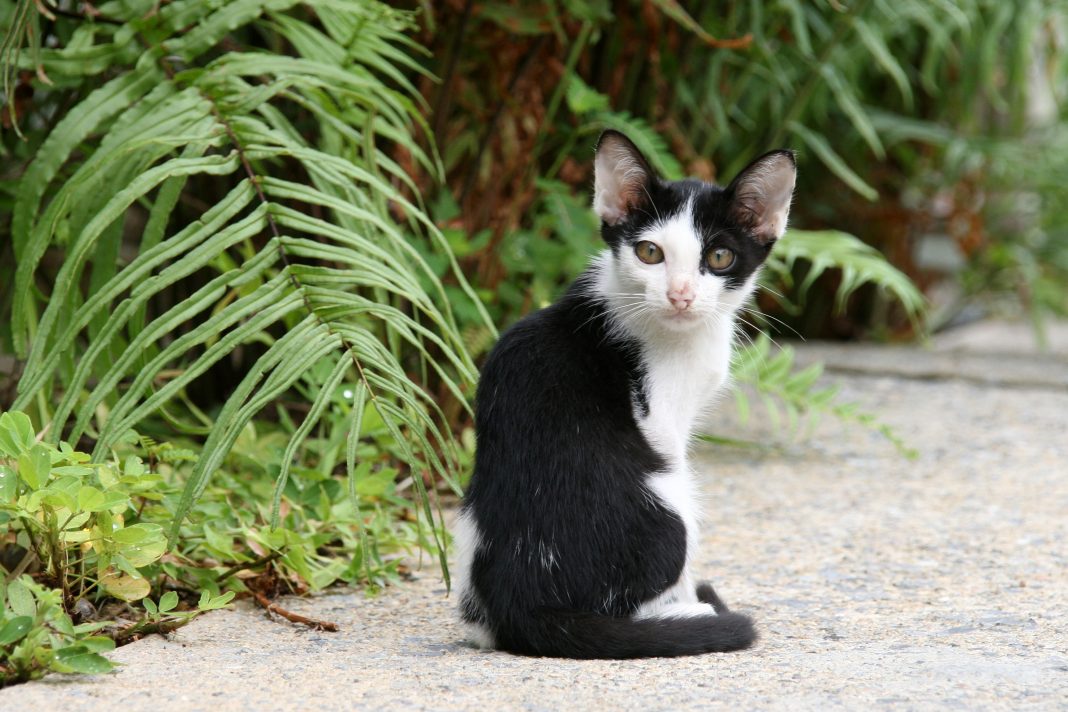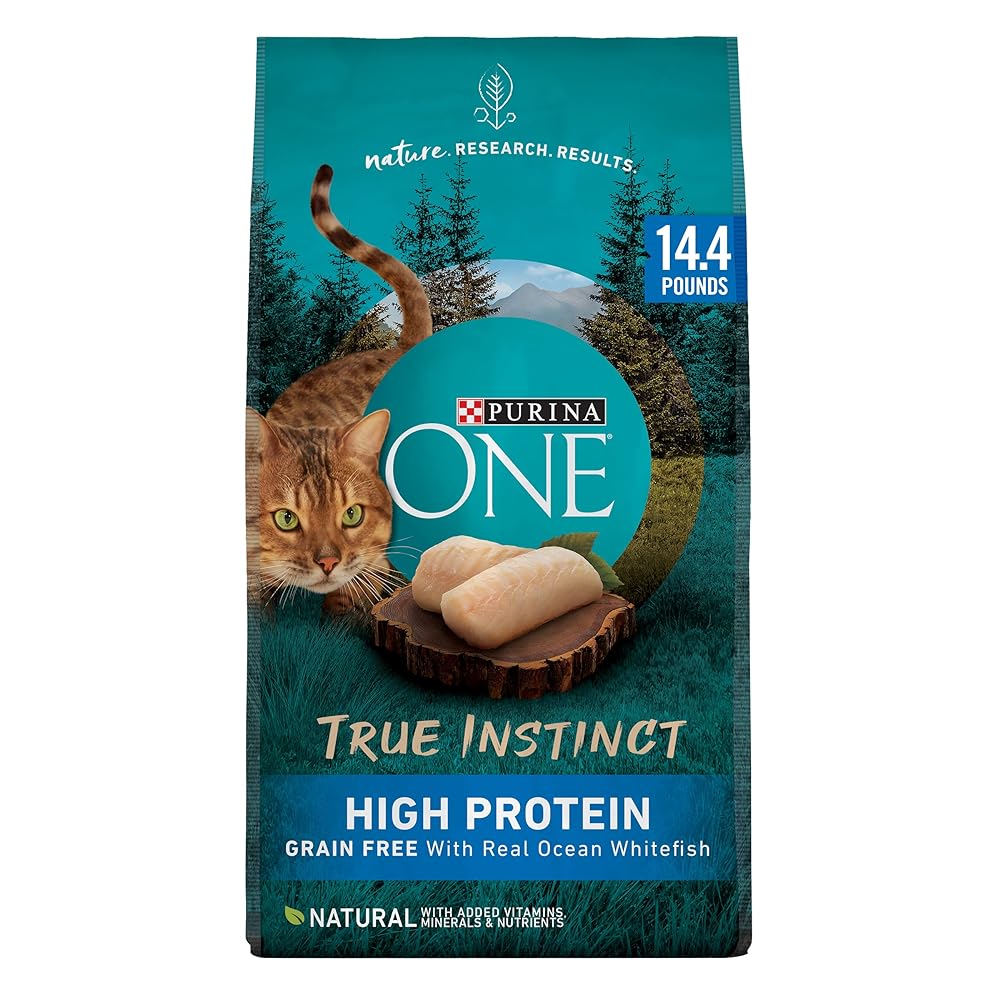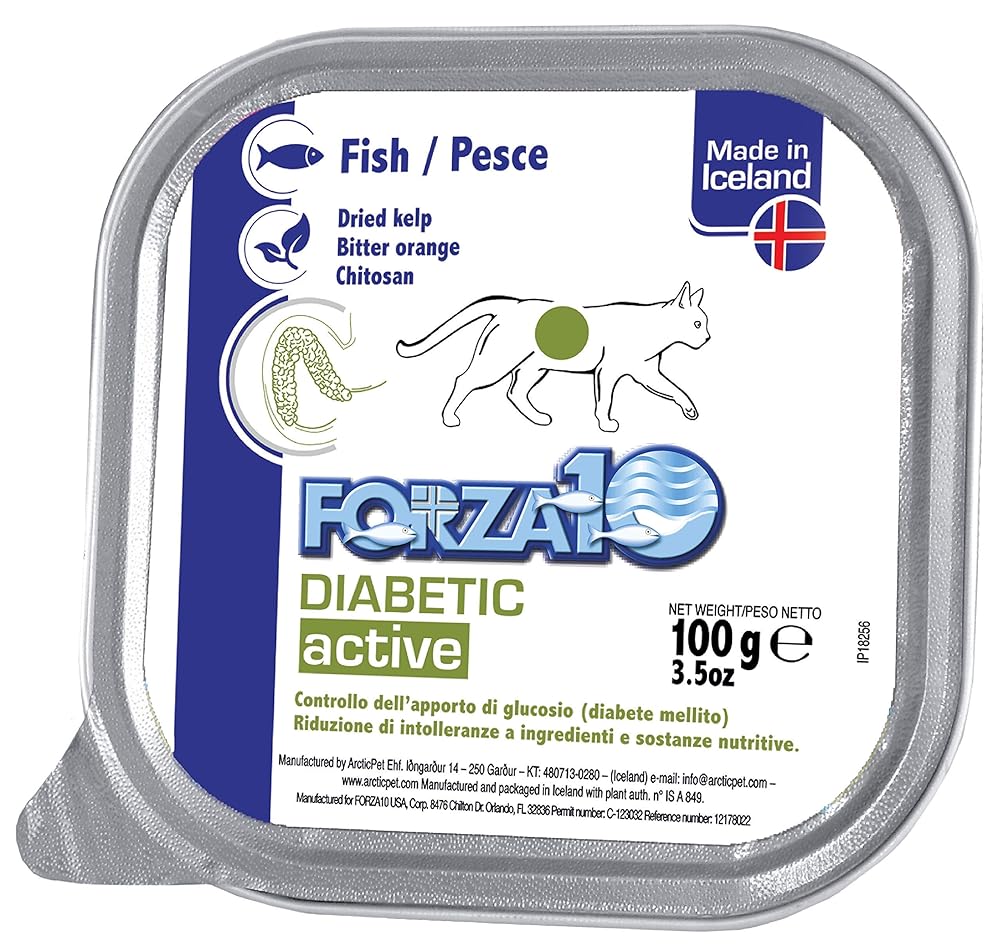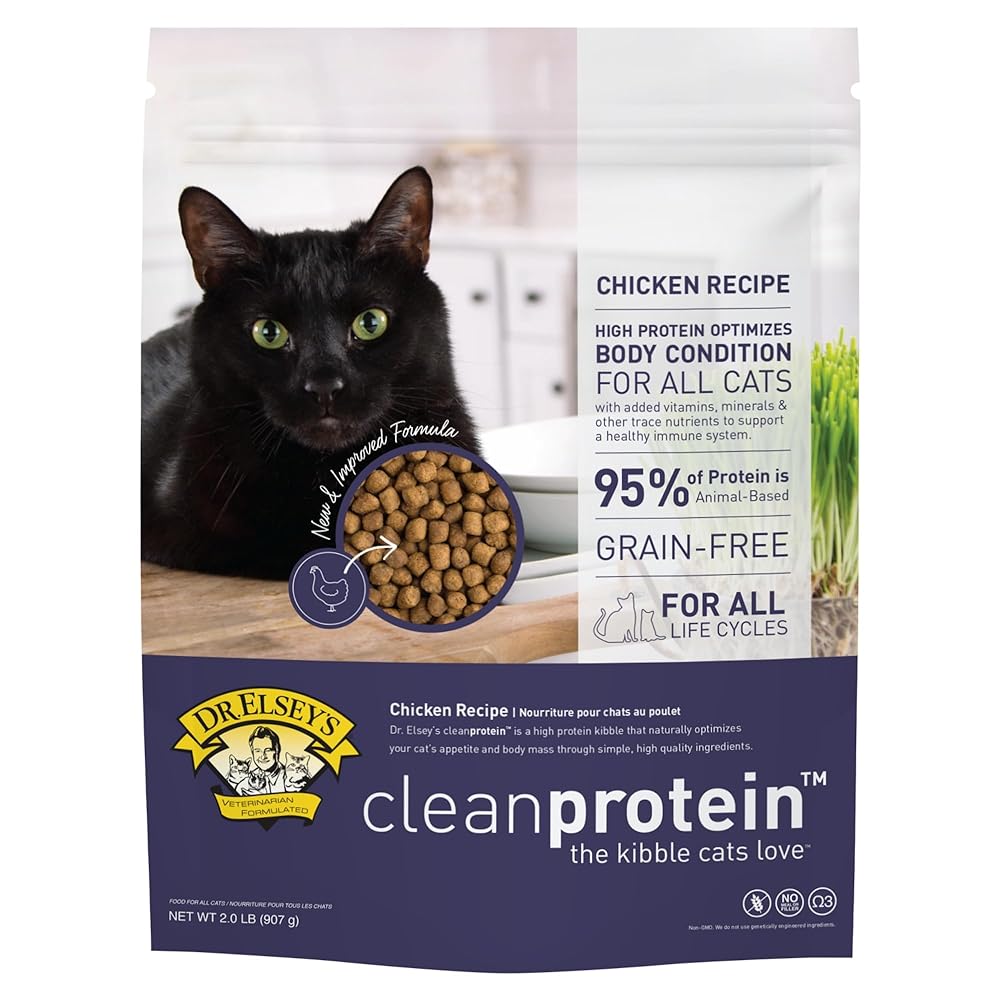Looking for the Best Cat Foods for Diabetic Cats? Managing feline diabetes effectively begins with the correct diet. Diabetic cats require foods that aid in maintaining stable blood glucose levels while providing all essential nutrients for overall health. In the market, various products are formulated to meet these specific needs. This article is designed to help you navigate through these options, highlighting the best cat foods that are not only appropriate for diabetic felines but also promote their well-being and longevity. The right food is crucial in managing diabetes and supporting a healthy, active life for your pet.
1. Hill’s Prescription Diet w/d Multi-Benefit Digestive
Hill’s Prescription Diet w/d Multi-Benefit is a dry cat food formulated by Hill’s nutritionists and veterinarians to address various health conditions in cats. It assists in managing glucose and weight, supports urinary health, and promotes healthy digestion. The food contains therapeutic levels of L-carnitine to metabolize fat and maintain lean muscle, an optimal blend of soluble and insoluble fiber to maintain a healthy weight, and reduced magnesium and sodium to promote urinary tract health. Its aim is to provide cats with love, quality, and overall good health through a tasty meal.
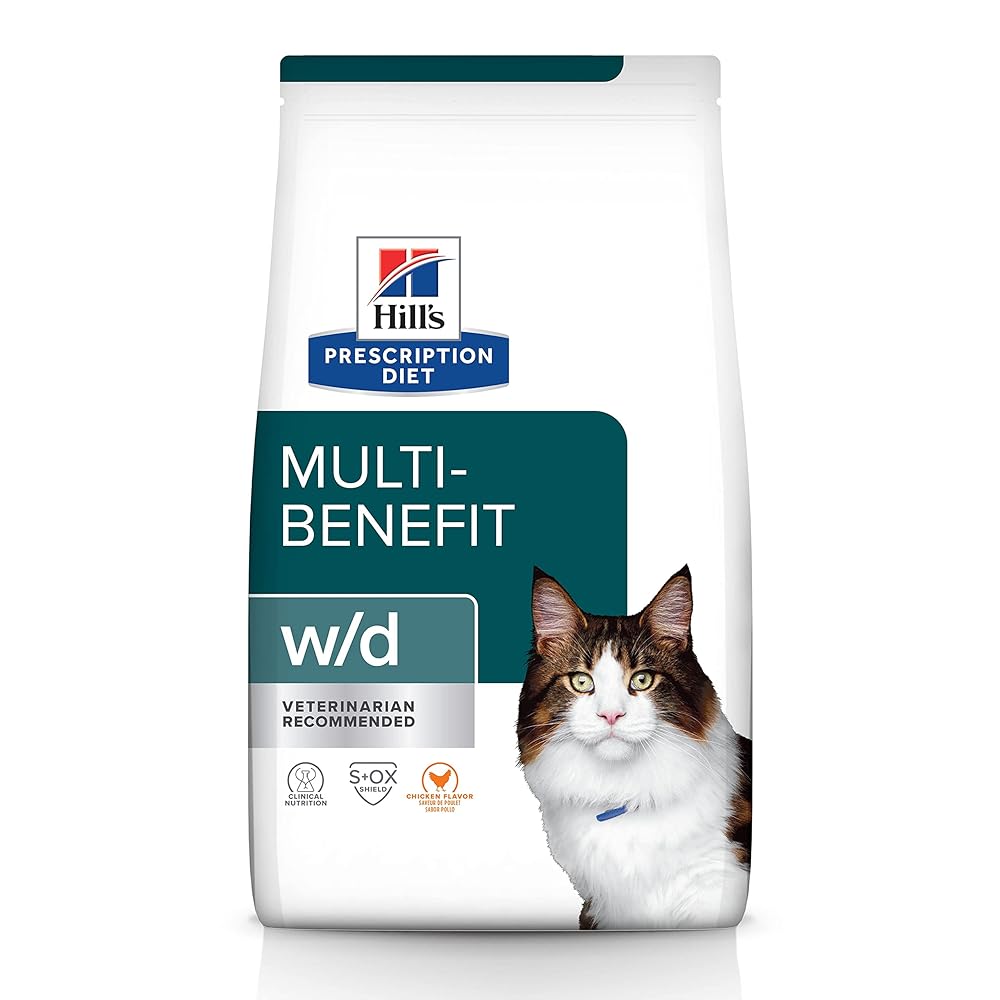
2. Hill’s Prescription Diet m/d GlucoSupport Chicken Flavor
Hill’s Prescription Diet m/d GlucoSupport Chicken Flavor Dry Cat Food is a veterinary diet formulated by Hill’s nutritionists and veterinarians to support cats with glucose and weight management issues. This food is designed to help cats lose weight and manage their blood sugar levels, with high protein and optimal carbohydrates. It is enriched with arginine, an essential amino acid, and clinically proven antioxidants to support a healthy immune system. While Hill’s Prescription Diet is the #1 US Vet Recommended therapeutic pet food, it is advisable to consult with your vet to determine if Prescription Diet m/d GlucoSupport is suitable for your cat.
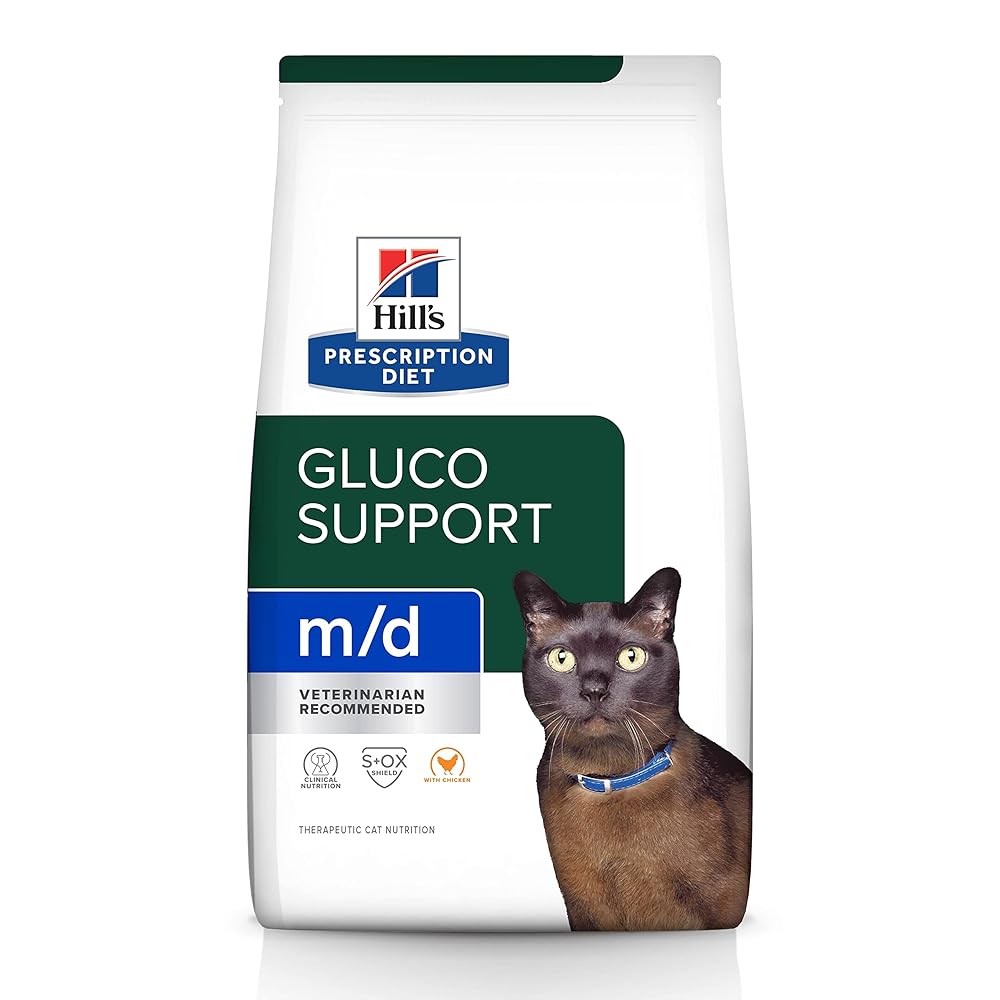
3. Purina ONE Natural, High Protein, Grain Free Dry Cat Food
Purina ONE Natural, High Protein, Grain Free Dry Cat Food, True Instinct With Real Ocean Whitefish is a cat food that is high in protein and grain-free. It contains real ocean whitefish as the main ingredient and provides 35 percent protein to promote strong muscles and a healthy heart. The cat food also includes omega-6 fatty acids for healthy skin and coat, four antioxidant sources for a strong immune system, and is crafted in Purina-owned facilities in the U.S. It is made with high-quality ingredients that are easy to digest.
4. Dr. Elsey’s Cleanprotein Grain Free High Protein
Dr. Elsey’s Cleanprotein Grain Free High Protein, Low Carb Dry Cat Food is a product that offers nutrition to cats with its high protein content. With over 90% of the protein being derived from animal sources, it helps optimize the body condition of cats of all ages. The primary ingredients used are known for their high biological value proteins, ensuring a balanced and nutritious meal. Additionally, the product is free from grains and gluten and contains omega-3 fatty acids for the overall health of cats.
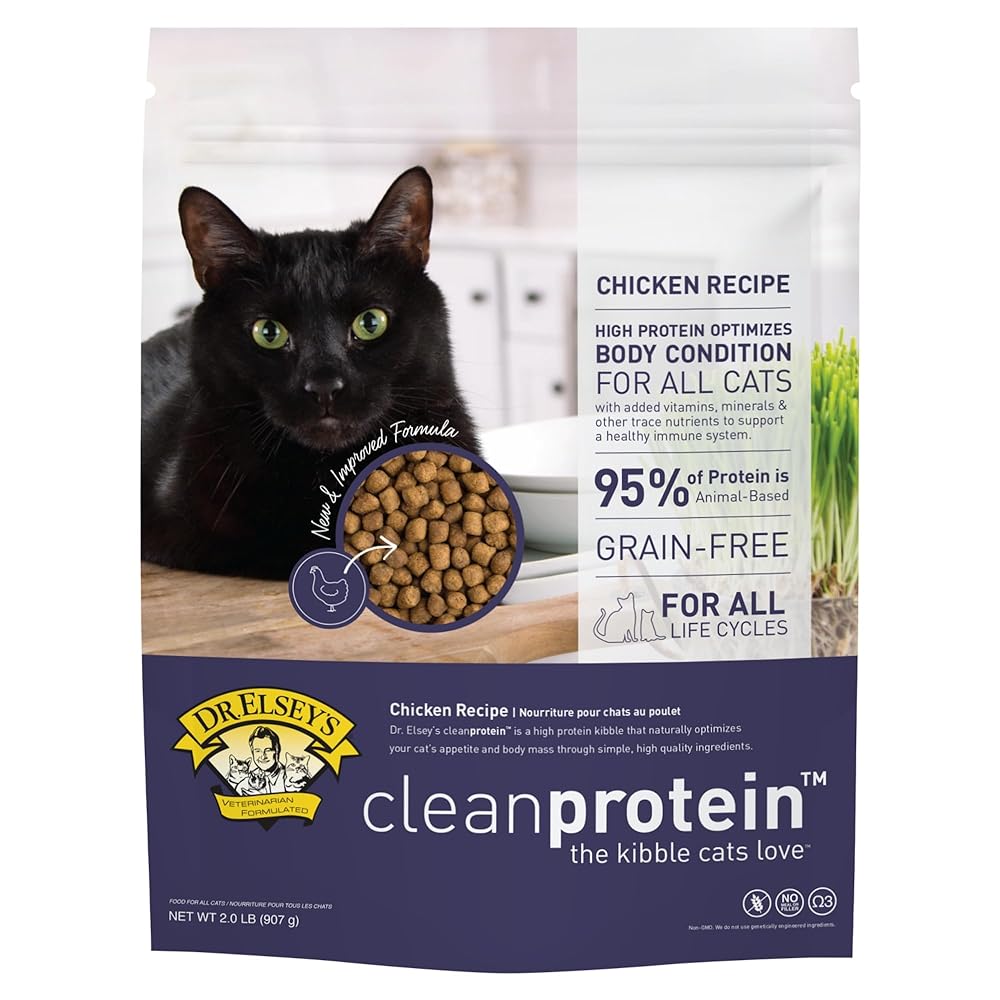
5. Forza10 Wet Diabetic Cat Food for Diabetic Support
Forza10 Wet Diabetic Cat Food is a specially formulated wet cat food designed to support the therapy of insulin-dependent diabetes in cats. The recipe is based on salmon fish, providing omega-3 fatty acids for overall health and helping control glucose intake. It includes natural ingredients such as dried kelp, bitter orange, and chitosan, which have anti-inflammatory and immune-boosting properties. This complete and balanced diabetic cat food is made in Iceland using natural raw materials with antioxidant properties that can help prevent and eliminate food intolerances. It is a healthy and delicious option that is vet-recommended for cats with diabetes.
6. Purina Pro Plan Veterinary Diets
Purina Pro Plan Veterinary Diets DM Dietetic Management Feline Formula Wet Cat Food is a product that is designed to support healthy glucose levels in cats. With a high protein and low carbohydrate formula, it helps cats maintain lean body mass and ideal body condition. The diet also includes antioxidants and promotes a urinary environment that is unfavorable to the development of crystals.
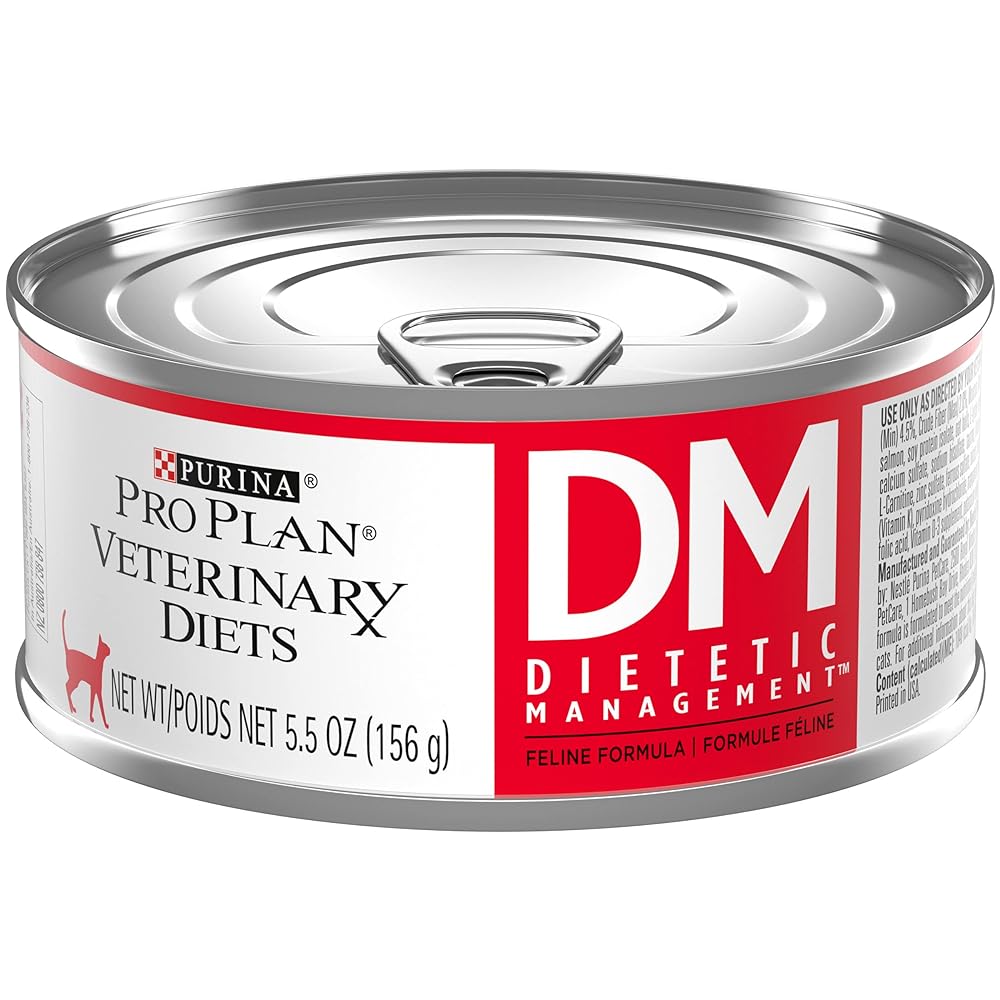
7. Purina Pro Plan Veterinary Diets
Purina Pro Plan Veterinary Diets DM Dietetic Management Feline Formula Dry Cat Food is a specialized food designed to meet the nutritional needs of diabetic cats. This diet is high in protein and low in carbohydrates, providing support for cats with diabetes. Additionally, it includes St/Ox Defense to promote a urinary environment that discourages the formation of crystals. The food also contains antioxidant-rich nutrition and is known to be palatable for cats.
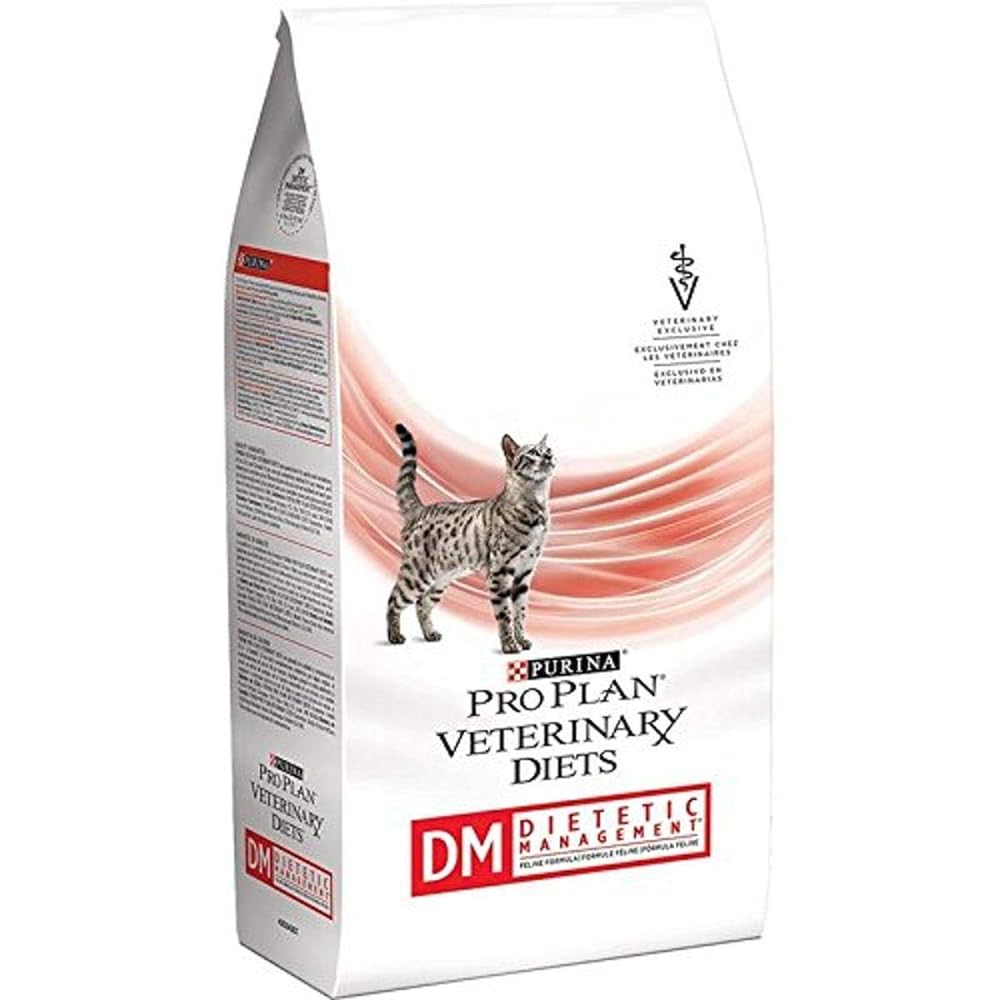
8. Dr. Elsey’s Cleanprotein Grain Free High Protein
Dr. Elsey’s Cleanprotein Grain Free High Protein, Low Carb Dry Cat Food is a cat food that contains over 90% animal-based protein, which helps optimize the body condition of all cats. The primary ingredients used in this product are known for their high biological value proteins. Additionally, it is 100% grain-free and gluten-free, while also providing Omega-3 fatty acids.
What’s Important When Choosing a Food for A Diabetic Cat?
When choosing food for a diabetic cat, several factors are crucial to consider to effectively manage their condition:
- Low Carbohydrate Content: Diabetic cats typically require diets low in carbohydrates. High carbohydrate diets can lead to increased blood sugar levels. Opt for foods that list meat as the first ingredient and have minimal filler content like grains and starches.
- High Protein Content: A high-protein diet is essential for maintaining lean muscle mass and managing weight, which is crucial for diabetic cats. Look for diets that derive most of their calories from high-quality animal proteins.
- Consistent Formula: Diabetic cats benefit from a consistent diet. Avoid frequently changing their food types or brands as this can lead to fluctuations in blood glucose levels, making it harder to manage the condition.
- Fiber: Dietary fiber can help regulate blood sugar levels by slowing the absorption of glucose into the bloodstream. However, the type and amount of fiber are important, so consult your veterinarian for specific recommendations.
- Wet or Canned Foods: These often have higher protein and lower carbohydrate content compared to dry kibble. Plus, they help in providing additional hydration which is beneficial for diabetic cats.
- Veterinarian Recommendation: Always consult with your veterinarian before making dietary changes. They can provide personalized dietary recommendations based on your cat’s health status, weight, age, and severity of diabetes.
- Brand Reputation: Choose cat food from reputable brands known for producing high-quality, consistent, and well-researched products. These companies often invest in research and quality ingredients to ensure the health and well-being of pets.
- Customer Reviews and Feedback: While not a definitive guide, customer reviews and feedback can provide insights into how other diabetic cats have responded to a particular food. Look for patterns of positive or negative responses, but consider these as supplementary to professional veterinary advice.
- Your Cat’s Preference: Ultimately, the best food is one that your diabetic cat is willing to eat consistently. Pay attention to their preferences regarding the flavor, texture, and type of food.
Managing feline diabetes requires a combination of appropriate medical treatment and careful dietary management. Always work closely with your veterinarian to develop and adjust your cat’s care plan over time.
What Are The Benefits of a Cat Food Made Specifically for Diabetic Cats?
A cat food formulated specifically for diabetic cats offers several significant benefits:
- Blood Sugar Control: Diabetic cat food helps in managing blood glucose levels. These diets are typically low in carbohydrates, which are the main dietary component that raises blood glucose. Managing these levels is crucial for the well-being of diabetic cats.
- Weight Management: Many diabetic cats struggle with obesity. Foods designed for diabetic felines often aid in weight management due to their high protein and low-fat content, helping the cat to lose or maintain weight while preserving lean muscle mass.
- Energy Regulation: The proper balance of nutrients in diabetic cat food ensures that the cat has a steady energy supply throughout the day, preventing spikes and crashes in energy levels.
- Dietary Consistency: Consistency is key for diabetic cats. Foods formulated for them provide a consistent nutritional profile, which is crucial for keeping their blood sugar levels stable. Regular changes in diet can lead to fluctuations in glucose levels, making diabetes harder to manage.
- Optimized Fiber Content: These foods often contain specific types of dietary fiber that slow down the absorption of glucose from the digestive tract, leading to more stable blood glucose levels throughout the day.
- Improved Insulin Sensitivity: Diets for diabetic cats are formulated to enhance the animal’s sensitivity to insulin, the hormone that regulates blood sugar levels. Improved insulin sensitivity helps the cat’s body use insulin more efficiently.
- Vet-Approved Formulations: Diabetic cat foods are often crafted with the guidance and approval of veterinary nutrition experts, ensuring they meet the specific dietary needs of cats suffering from diabetes.
- Enhanced Palatability: Cats can be picky eaters, and this doesn’t change if they are diagnosed with diabetes. Food for diabetic cats is designed to be tasty to encourage regular eating, as consistency in diet is crucial for managing the condition.
- Prevention of Complications: The right diet can help prevent or mitigate common diabetic complications, including kidney disease, due to carefully controlled levels of proteins and other nutrients.
Before transitioning your cat to a new diet, especially if it has been diagnosed with a medical condition like diabetes, always consult with a veterinarian to ensure it meets your pet’s specific health needs. They can guide you on the appropriate type and amount of food, as well as monitor your cat’s response to the new diet.
Frequently Asked Questions About Foods for Diabetic Cats
- What makes a cat food suitable for diabetic cats? Diabetic cat foods typically have low carbohydrate and high protein content to help regulate blood sugar levels. The formulation aids in maintaining a healthy weight while providing consistent energy, crucial for managing diabetes.
- How does low-carb food benefit diabetic cats? Low-carb diets help in stabilizing blood glucose levels since carbohydrates significantly impact blood sugar. A lower carbohydrate content in food results in fewer spikes in blood glucose, making diabetes easier to manage.
- Why is high protein important in diabetic cat food? High protein content helps diabetic cats maintain lean muscle mass while managing their weight. Since weight control is crucial for diabetic cats, a high-protein diet supports their overall health and metabolism.
- Should I only feed my diabetic cat wet food? Wet food is often recommended for diabetic cats due to its lower carbohydrate and higher protein content compared to dry kibble. However, the best diet depends on your cat’s specific needs and preferences, so consult your vet for personalized advice.
- Can I feed my non-diabetic cat food formulated for diabetic cats? While it’s generally safe, it’s essential to feed all cats a diet that meets their specific nutritional needs. Consult your veterinarian before making any significant changes to your pet’s diet to ensure it is appropriate for their health status.
- How often should diabetic cats be fed? Diabetic cats often benefit from a consistent feeding schedule, usually eating multiple small meals throughout the day. The feeding schedule should align with their insulin therapy, and your vet can provide specific recommendations.
- Can diabetic cat food prevent diabetes in cats? While diabetic cat food helps manage the disease, it doesn’t necessarily prevent it. Diabetes prevention involves a combination of factors including proper nutrition, regular exercise, and maintaining a healthy weight.
- Should I consult a vet before changing my diabetic cat’s diet? Absolutely. A veterinarian should always be consulted before making dietary changes to ensure the new food meets your cat’s specific health needs and dietary requirements.
- Is prescription diabetic cat food better than over-the-counter options? Prescription diabetic cat food is tailored for managing diabetes, with specific nutrient profiles and therapeutic benefits. However, some over-the-counter options may also be suitable. Always consult with a vet for the best choice for your pet.
- Will my cat need to eat diabetic cat food forever once diagnosed with diabetes? Diabetes in cats can sometimes be managed or even reversed with diet, medication, and lifestyle changes. However, each cat is different, and your veterinarian can provide the best dietary recommendations for your pet’s long-term health.
Final Summary: The Best Cat Foods for Diabetic Cats
In this article, we reviewed the Best Cat Foods for Diabetic Cats. Selecting the appropriate food is vital for managing your cat’s diabetes effectively. The products listed here are specially formulated to aid in blood glucose control and overall health. Before making any dietary changes, consult with your veterinarian to develop a personalized feeding plan that meets your cat’s individual health needs. With the right diet, diabetic cats can lead a fulfilling and active life, making dietary management a cornerstone in the care for felines with diabetes.

